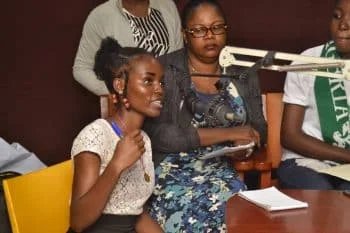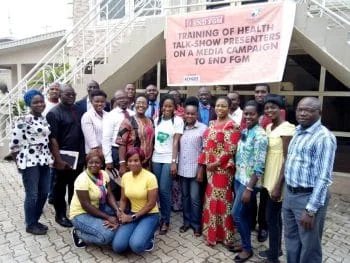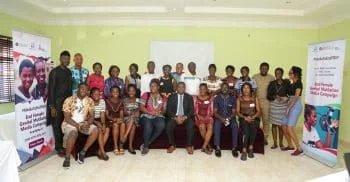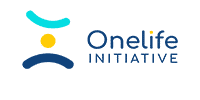NIGERIA MEDIA CAMPAIGN AGAINST FGM
Project Overview
Follow up activities to previous activities already engaged in led to this project. The focus was on leveraging various media strategies and platforms to contribute to the abandonment of Female Genital Mutilation in Nigeria across several states with high prevalence in Nigeria. Direct Action Grant to support this, Head to Head talk on radio, jingles, publication for circulation, training of radio journalists supported by the Global Media Campaign to EndFGM in Nigeria were some of the key activities implemented under this project.



Key Information
In line with listed activities, 21 journalists from 19 states in Nigeria were trained at the academy. A leading newspaper in Nigeria with national reach reported the event on its front page with 11,085 reach on twitter during the training. Content produced on various FGM themes were also circulated and jingles placed on air. In addition, the media was monitored in the course of the project with 24 major print reports spotted and analysed. Asides this, jingles were produced and aired in five languages – Hausa, Igbo, Ijaw, Yoruba and Pidgin English. The Head-to-Head talk also held in four states spread across the north and southern part of the country for a month. Another major component of the project was the Direct Action Grant wherein applications were received from across the country and 14 radio journalists and activists were funded to carry out activities through the Direct Action Grant support.
A total of about 37 million Nigerians were reached through these activities. With respect to the Direct Action Grant –
- 9 states of FGM practice in Nigeria were reached through the Direct Action Grant.
- 4 radio journalists and activists across Nigeria were funded through the Grant.
- Activities of the Direct Action Grant were reported in 3 dailies, and 1 news blog.
- 2 TV Stations – 1 local and the other international carried the activities made possible by the grant.
- 6 kings were visited in Osun State – a state with the highest FGM prevalence.
- 11 Radio stations across Nigeria were utilised in reaching the goal of the Grant; which is to create awareness about ending FGM through the media.
- 3 reports of the activities were featured in national dailies.
Project Challenges
- The schedule of some of the radio programme did not go as earlier planned. Given that some of them with the highest reach are government-run and poorly funded, some contents did not go on air because of power supply cut when we wanted them to;
- Some of the activities on the DAG fell on periods when Secondary Schools were on break. This led to alteration in the arrangement of things earlier scheduled;
- In a particular instance, the radio journalist did not seem unbiased. A cutter was brought on air versus another discussant not strongly opinionated about the ills of FGM. It thus came off as though we were paying to get pro-FGM content on air;
- The number of slots for the jingle was little. It would have made more difference if it was run repeatedly for a quarter on air at a particular time so more people can hear it repeatedly.
- A community in Kwara state resisted a sensitization activity on hearing that it was on FGM.
